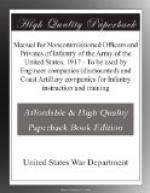The skin protects the sensitive parts underneath from injury and helps to keep out germs. Therefore when blisters are formed don’t tear off the skin. Insert a needle under the skin a little distance back from the blister and push it through to the opposite side. Press out the liquid through the holes thus formed. Heat the needle red hot first, with a match or candle, to kill the germs.
When the skin is broken (in cuts and wounds) keep the opening covered with a bandage to keep out germs and dirt; otherwise the sore may fester. Pus is always caused by germs.
Keep your hair short. Long hair and a long beard in the field generally means a dirty head and a dirty face and favors skin diseases, lice, and dandruff.
Don’t let any part of the body become chilled, as this very often is the direct cause of diarrhea, dysentery, pneumonia, rheumatism, and other diseases.
Wet clothes may be worn while marching or exercising without bad results; but there is great danger if one rests in wet clothing, as the body may become chilled.
Don’t sit or lie or sleep directly on damp ground, as this is sure to chill the body.
When hot or perspiring or when wearing damp clothes, don’t remain where a breeze can strike you. You are sure to become chilled.
Every day, if possible, hang your blanket and clothing out to air in the sun; shake or beat them with a small stick. Germs and vermin don’t like this treatment, but damp, musty clothing suits them very well. Wash your shirts, underwear, and socks frequently. The danger of blood poisoning from a wound is greatly increased if the bullet passes through dirty clothes.
Ditch your tent as soon as you can, particularly a shelter tent, even if you camp for one night only. Otherwise a little rain may ruin a whole night’s rest.
Always prepare your bed before dark. Level off the ground and scrape out a little hollow for your hips. Get some straw or dry grass if possible. Green grass or branches from trees are better than nothing. Sleep on your poncho. This keeps the dampness from coming up from the ground and chilling the body. Every minute spent in making a good bed means about an hour’s good rest later on.
Avoid the food and drink found for sale in the cheap stands about camp. The quality is generally bad, and it is often prepared in filthy places by very dirty persons.
The use of intoxicating liquor is particularly dangerous in the field. Its excessive use, even at long intervals, breaks down one’s system. Drinking men are more apt to get sick and less liable to get well than are their more sober comrades. If alcohol is taken at all, it is best after the work of the day is over. It should never be taken when the body is exposed to severe cold, as it diminishes the resistance of the body. Hot tea or coffee is much preferable under these circumstances.




